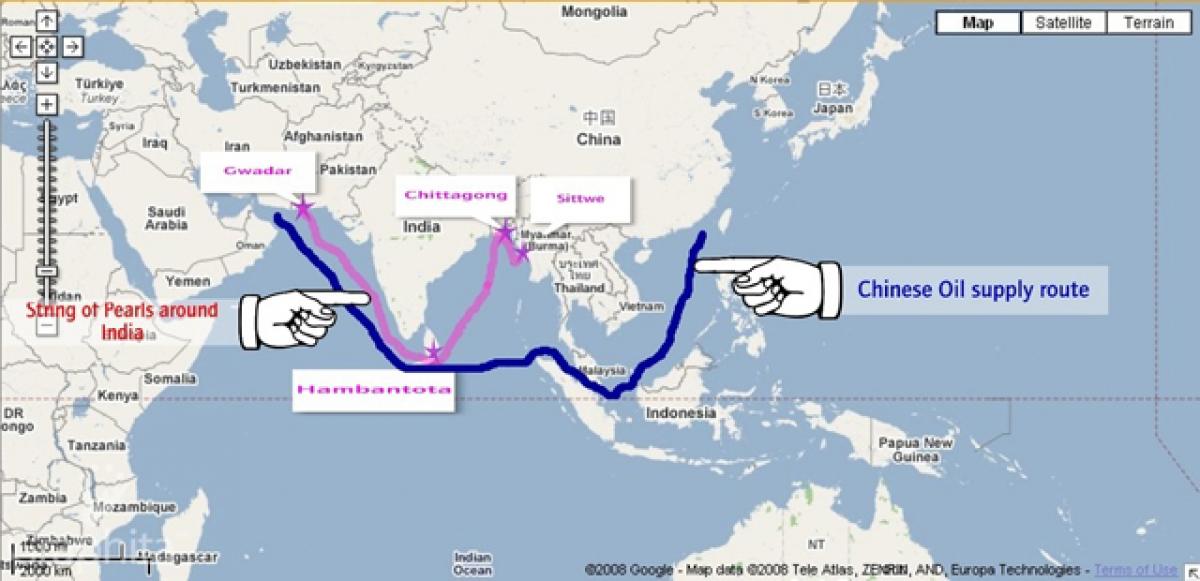Live
- Karnataka Reviews Lake Safety Ahead of Monsoon: Minister Bhosaraju Tells Upper House
- Udupi MP’s queries, More key highways on high-priority
- Investing in Skills: Education Loans Paving the Way for Career Success
- Ghaggar river’s two stretches identified as polluted: Govt
- ICC chief Jay Shah meets Brisbane 2032 Olympics organising committee CEO
- Oxford Grammar High School Celebrates 44th Annual Sports Day with Grandeur
- Indian banking sector’s health remains robust, govt policy working very well: Top bankers
- iOS 18.2 Unveiled: New Features with ChatGPT Integration Revolutionize Your iPhone
- 'Run for Viksit Rajasthan' to be annual event, says CM Sharma
- Nitish Kumar launches '109 free medicine vehicles' in Patna
Just In

Chinese shadow over Indo-Bangla bonhomie. On June 6 the Dhaka Tribune, a respected and reliable Bangladeshi newspaper, carried a report which merits attention. According to it, Chinese Premier Li Keqiang would visit Bangladesh in September to commemorate 40 years of diplomatic relations between the two countries.
Diplomatic circles talk about the Chinese String of Pearls theory which, in effect, means acquiring important bases to encircle India. Gwadar port in Pakistan and Chittagong in Bangladesh give China two excellent bases for keeping an eye on the Indian Ocean
On June 6 the Dhaka Tribune, a respected and reliable Bangladeshi newspaper, carried a report which merits attention. According to it, Chinese Premier Li Keqiang would visit Bangladesh in September to commemorate 40 years of diplomatic relations between the two countries.
.jpg)
The timing was significant. Indian Prime Minister Narendra Modi was visiting Bangladesh as the euphoria over the signing of the Land Boundary Agreement was sweeping the country. Was Dhaka trying to send a message to New Delhi? Perhaps one cannot be faulted for trying to detect a pattern in it. Obviously, Bangladesh is trying to reposition itself in South Asia's strategic map.
Dhaka knows it very well that it enjoys a highly geo-strategic position and has perhaps decided to use it to the hilt. Let us wait for Li's visit. Meanwhile some light may be thrown on Dhaka's growing relations with Beijing. In June 2014, Sheikh Hasina had visited China. There, she not only entered into some agreements which were militarily uncomfortable for India but after coming back to Dhaka she expressed her readiness to condone China for its hostile attitude during the Bangladesh Liberation War.
What was most important was Hasina admitted that her country's relationship with China had assumed a strategic nature. Not that India does not understand the import of Bangladesh slowly drifting towards China's sphere of influence. The initiative taken by Narendra Modi in ratifying the Land Boundary Agreement by the Indian parliament and ultimately the signing of it in Dhaka are an outcome of this realisation.
Apart from it, many agreements on trade, commerce, economic cooperation and rail-road-water connectivity have been signed. There will be a fresh Indian credit of $2 billion amd a power transmission for 35 years. The Indian private sector too would make heavy investments in Bangladesh. But not a word on military cooperation was heard. Bangladesh is on a weapon buying spree for the last couple of years. Its silent acquisition of arms should surprise Indian policymakers. Apart from the two submarines, it commissioned two new Chinese frigates in 2014.
Bangladesh's unique geo-strategic location gives it the advantage of overlooking the highly strategic sea lanes of the Indian Ocean which connect China to the Persian Gulf and the Strait of Hormuz, thereby securing its energy supplies. In this context Bangladesh's decision to hand over the task of modernization and development of the Chittagong port to the Chinese has given rise to intense controversy. It is axiomatic that China will retain the right of using this port according to its needs.
Secondly, Bangladesh has plans to build up another deep sea port. Earlier the site chosen was the Sonadia island off Cox Bazar. But Dhaka faced intense international pressure over the issue, particularly from the US and India as work for this project too was slated to be handed over to China. There are enough reasons for India to remain skeptical about Bangladesh's role.
Diplomatic circles talk about the Chinese String of Pearls theory which, in effect, means acquiring important bases to encircle India. Gwadar port in Pakistan and Chittagong in Bangladesh give China two excellent bases for keeping an eye on the Indian Ocean. Chittagong will also make China's sea connectivity much easier.
By Amitava Mukherjee

© 2024 Hyderabad Media House Limited/The Hans India. All rights reserved. Powered by hocalwire.com







